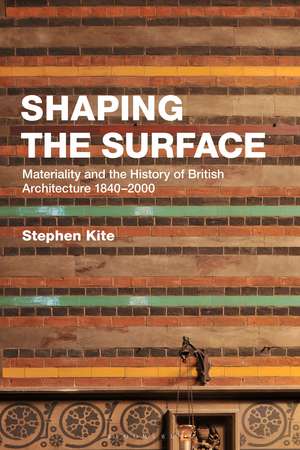Shaping the Surface: Materiality and the History of British Architecture 1840-2000
Autor Professor Stephen Kiteen Limba Engleză Paperback – 14 dec 2022
| Toate formatele și edițiile | Preț | Express |
|---|---|---|
| Paperback (1) | 180.88 lei 3-5 săpt. | +47.95 lei 4-10 zile |
| Bloomsbury Publishing – 14 dec 2022 | 180.88 lei 3-5 săpt. | +47.95 lei 4-10 zile |
| Hardback (1) | 509.52 lei 3-5 săpt. | |
| Bloomsbury Publishing – 14 dec 2022 | 509.52 lei 3-5 săpt. |
Preț: 180.88 lei
Preț vechi: 208.89 lei
-13% Nou
Puncte Express: 271
Preț estimativ în valută:
34.62€ • 36.05$ • 29.26£
34.62€ • 36.05$ • 29.26£
Carte disponibilă
Livrare economică 18 februarie-04 martie
Livrare express 01-07 februarie pentru 57.94 lei
Preluare comenzi: 021 569.72.76
Specificații
ISBN-13: 9781350320659
ISBN-10: 135032065X
Pagini: 352
Ilustrații: 114 bw illus
Dimensiuni: 156 x 234 x 25 mm
Greutate: 0.45 kg
Editura: Bloomsbury Publishing
Colecția Bloomsbury Visual Arts
Locul publicării:London, United Kingdom
ISBN-10: 135032065X
Pagini: 352
Ilustrații: 114 bw illus
Dimensiuni: 156 x 234 x 25 mm
Greutate: 0.45 kg
Editura: Bloomsbury Publishing
Colecția Bloomsbury Visual Arts
Locul publicării:London, United Kingdom
Caracteristici
The lens of surface offers insightful readings of the works and ideas of key actors in British-English architectural Modernism at major cultural moments, including Romanticism, the Arts and Crafts, the Picturesque, Brutalism, High-Tech, Post-Modernism, Neo-Vernacular, and the New Materiality
Notă biografică
Stephen Kite is Emeritus Professor at the Welsh School of Architecture, Cardiff University, Wales, UK. His previous books include Shadow-Makers: A Cultural History of Shadows in Architecture (Bloomsbury, 2017).
Cuprins
IntroductionChapter 1: Reading the wall-surface: John Ruskin, William Butterfield, and George Edmund StreetChapter 2: 'Think first of the walls': Surfaces of Romance - Morris, Webb, and the Arts and Crafts Domestic InteriorChapter 3: Smooth and Rough: George Frederick Bodley and Edward Schröder PriorChapter 4: Carving the Surface:Edwardian and Inter-War Architecture and SculptureChapter 5: Surfaces and Sharawaggi:Aspects of the Picturesque c 1925-1955Chapter 6: As-Found: Surfaces of Brutalism Chapter 7: Pattern, Abstraction, Post-Modernism: Lubetkin - Pasmore - Stirling Chapter 8: High-Tech, Neo-Vernacular, New Materiality:Richard Rogers - Ralph Erskine - Caruso St John BibliographyIndex
Recenzii
Shaping the Surface adopts the stance that the familiar appeal for depth could be reversed: that we must concentrate on appearance; we must become superficial. It is a fascinating point of departure which returns meaning to the fact of being in the world, the surface being the site where we and others meet.
Stephen Kite boldly brings together some unlikely bed-fellows in this perceptive study of the persistence of surface in English architecture. Where most studies of this period focus on its transitions and disjunctures, Kite reveals a surprising level of continuity in the primacy of surface in architects as varied as Ruskin, Bodley, Holden, the Smithsons and Caruso St John.
Stephen Kite boldly brings together some unlikely bed-fellows in this perceptive study of the persistence of surface in English architecture. Where most studies of this period focus on its transitions and disjunctures, Kite reveals a surprising level of continuity in the primacy of surface in architects as varied as Ruskin, Bodley, Holden, the Smithsons and Caruso St John.
